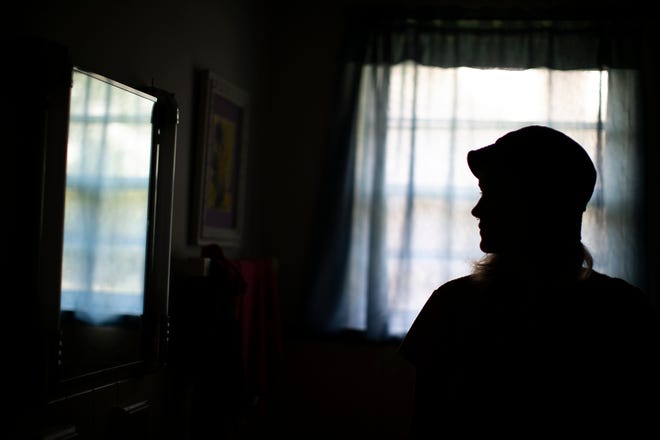
Orion Hower is waiting until they move to Michigan for college before seeking mental health care.
Hower, who is nonbinary and uses they/them pronouns, has been in the mental health care system since they were 10 years old. When Hower turned 18, they said it was difficult and exhausting to look for a therapist in Ohio who both affirmed their gender identity and accepted their insurance.
“Ohio is my home and it always will be my home,” Hower, now 19, said. “But it’s not worth it if it’s going to be sacrificing my own well-being and mental health in order to live under the guise that I am a cis person.” “Cis” refers to cisgender, meaning a person’s gender identity matches the sex they were assigned at birth.
LGBTQ terms, explained: From agender to transitioning, a reader’s guide to LGBTQ terms and phrases

Hower said the conscience clause has only strengthened their resolve to wait.
The conscience clause, signed by Gov. Mike DeWine on July 1 as part of Ohio’s state budget, allows medical providers to refuse to perform specific services if they violate their religious, ethical or moral beliefs.
Osteopathic physician and state Sen. Terry Johnson, R-McDermott, introduced the amendment to the budget last-minute, without any public hearings. In a statement to the Dispatch, Johnson said “there is much more to the art and science of healing than blind subservience” and medical providers’ conscience and moral compass require protection.
DeWine said he believes people will not be discriminated against because of the conscience clause.
However, LGBTQ rights advocates say the conscience clause will strengthen barriers to mental health care for LGBTQ people, particularly LGBTQ youth. Erin Upchurch, who leads the Kaleidoscope Youth Center, a Columbus-based organization providing resources to LGBTQ youth, said the conscience clause ostracizes a population already less likely to seek mental health care.
As a licensed independent social worker who has worked with LGBTQ youth, Upchurch said denying treatment because of personal objections to someone’s identity violates medical ethics.
“How does the conscience of discrimination supersede the conscience of doing no harm?” Upchurch said.
About 42% of LGBTQ youth age 13-24 seriously considered suicide in the past year, according to a survey of 35,000 LGBTQ youth by the Trevor Project, a crisis prevention organization for LGBTQ youth.
“I know the moral argument they’re making, but the result is the death of queer people,” said Chandler Rupert, an 18-year-old gay activist at Ohio State University.
Seeking care in the closet
Upchurch said being transparent with providers about gender and sexual identity is crucial to getting comprehensive care.
“It’s very challenging to treat the whole person without knowing the whole person,” Upchurch said. “If I go to my doctor with an issue and I’m not able to disclose who I am as a person, they can’t adequately treat who I am.”
More: For transgender Americans, the doctor’s office experience often a difficult one
Jhalez Caldwell-Craig, an 18-year-old from the South Side, knows what it’s like to seek care without being able to express their full identity. Caldwell-Craig, who uses they/them pronouns and identifies as pansexual and nonbinary, said they weren’t comfortable disclosing their gender and sexual identity to their first therapist, who they saw when they were 14.
“Whenever she would talk about LGBT people she would work with, there was always this twinge of ‘I’m not homophobic, I just don’t agree with their lifestyle,’ ” Caldwell-Craig said. “I’m like, ‘Alright, should I not tell you any more about my experiences?’ ”
Caldwell-Craig, like Hower, said the conscience clause and similar anti-LGBTQ legislation was a serious incentive for leaving Ohio. Caldwell-Craig now goes to school in Maryland.
Hower, who started realizing their gender did not match the one assigned to them at birth in middle school, said when they did feel comfortable bringing up their identity, it often became the focus of treatment. When they were in treatment for an eating disorder in high school, therapists asked – despite Hower’s repeated assertions to the contrary – whether gender dysphoria was the main cause of their symptoms.

Another therapist Hower saw insisted that Hower see someone who specializes in transgender issues, even after Hower said it wasn’t the reason they needed care.
‘Why can’t LGBTQ people just choose an affirming provider?’
While advocates for the conscience clause say LGBTQ people can simply seek mental health care with LGBTQ-affirming providers and likely already do, LGBTQ advocates say many youths don’t have the privilege to do so.
“Not everyone can choose their own provider, not everyone can choose their own insurance carrier. People often can’t choose where they’re currently located,” James Knapp, chair of TransOhio, the state’s largest transgender equality group, said.
Knapp believes it’s offensive to tell people they can travel elsewhere when they can’t. He said he’s lucky he can choose between multiple hospital systems in Cleveland, but that’s not the case in rural Ohio, where patients may have fewer options and affirming care may not be available.
Nearly half of LGBTQ youth who wanted to speak with a mental health provider in the past year did not, according to the Trevor Project. The main reason youth reported for not seeking care was an inability to afford it.
Other reasons the Trevor Project found for youth not seeking care included fear of asking their parents for permission, fear that they may be outed to their parents and previous negative experiences with providers.
Knapp said the conscience clause may embolden providers to refuse service if they were previously required to treat LGBTQ people by their clinic or employer. He also worries the bill will attract more people who want to discriminate against LGBTQ people to the medical profession.
What this means nationally
Rupert said he worries the recent passing of Ohio’s conscience clause will cause a “domino effect” of other anti-LGBTQ – and specifically anti-transgender legislation.
More than 250 anti-LGBTQ bills have been introduced in state legislatures across the country, which Human Rights Campaign called the “worst year for anti-LGBTQ legislation in recent history.” Six states currently have exemptions allowing doctors to deny health care on religious grounds and four of those states allow doctors to deny health care for moral or ethical reasons. LGBTQ activists in those states were similarly concerned that their state’s conscience clause would allow medical providers to turn LGBTQ patients away.
At the same time, LGBTQ youth are seeking crisis prevention help at higher rates than before. The Trevor Project’s crisis services, which include a hotline, textline and online chat service, were contacted more than 150,000 times during fiscal year 2020, up from 2019’s high of 98,000.
Savannah Carlstrom Page, a behavioral health practitioner at Kaleidoscope Youth Center, said the mere introduction of such legislation and discussion surrounding queer people’s rights can be upsetting at best and traumatic at worst.
“It adds to folks’ experience of minority stress and cumulative community trauma anytime a decision like this is made that is going to harm folks,” Carlstrom Page said. “Even if it doesn’t come down to the single person, it impacts all of us.”
sszilagy@gannett.com
@sarahszilagy
Grace Deng is a reporter for the USA TODAY Network Ohio Bureau, which serves the Columbus Dispatch, Cincinnati Enquirer, Akron Beacon Journal and 18 other affiliated news organizations across Ohio.








